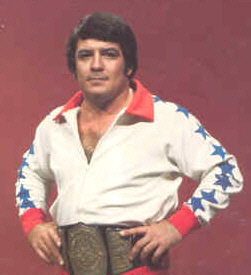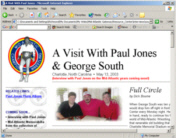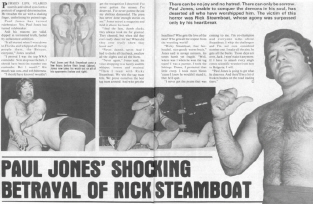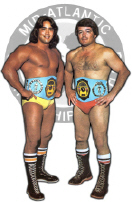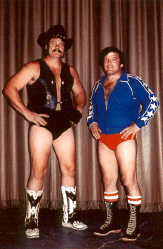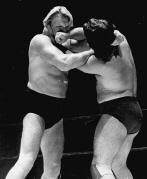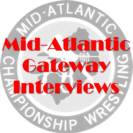
|
|
What is the common denominator in all of the above? Paul Jones. |
|
|
Part One
Full Circle: A Visit with Paul Jones & George South Return to the Mid-Atlantic Gateway lobby. © 2003 Mid-Atlantic Wrestling Gateway
Also see: The Paul Jones Interview on CWF Archives
|
|||
| Recently,
David Chappell and I had our second opportunity to have lunch and spend
the better part of an afternoon with Paul Jones and George South. It was
our interview session with Paul where we discussed topics ranging from
the famous 1975 US title tournament in Greensboro, to the Wilmington
plane crash, to his signature moves and big houses to the psychology of
working in the ring.
Because it was more of an open, unstructured conversation rather than an organized question and answer session, I will present it in much the same manner, skipping from topic to topic. Along the way, Paul's good friend George South, a 22 year veteran of the business himself, participated in the conversation, questions, and good natured ribbing. Part One - Great Angles, Great Opponents One of the topics that kept popping up was the misconception that he had once turned heel on Ricky Steamboat. It's one of the most famous Mid-Atlantic Wrestling angles, after all. I clearly remember it was Paul that turned on Steamboat. But Paul Jones doesn't remember it that way. Not at all. And before the afternoon was over, he had me convinced Ricky Steamboat had indeed turned on him after that two-ring battle royal in Charlotte. And Paul will tell you that's what got Steamboat over. In fact, Paul got everyone over. And throughout the afternoon, he almost assumed that wonderful heel persona that I loved so much in 1979: Paul: See, when Wahoo first came in here, he wasn't getting over. So George Scott, who was the booker, he put Wahoo with me, and I got Wahoo over as my partner. George did the same thing with Ricky Steamboat. Steamboat came in here and at first they weren't even trying to put him over, he was getting beat on TV every week. And then George saw possibilities in him and so George teamed him up with me and I got him over. Heck, I got him over, and to show his appreciation, he turned on me. (Laughs).
DB: (laughing) I don't remember it quite that way.
Paul: Well, that's exactly what happened.
DC: George, get me Ricky's phone number and let's verify that.
DB: Man, that whole angle came out of nowhere at the time. Which I guess is one reason it worked so well.
Paul: Exactly, the element of surprise.
DB: And when someone turned back in those days, it meant something. Now guys bounce back and forth every week it seems.
George: The fans have to care about you to begin with if the turn is going to work. If they didn't care about you as a babyface, they weren't going to care about you as a heel.
Paul: Yeah, every time I turned, no matter whether I was a good guy or a bad guy, what ever I was at the time, I was over. And if you switch it then with the right angle, then you're over as much as you were before the switch. You've got to be really hot. And I was really hot when Steamboat turned on me.
DB: Your memory is getting a little fuzzy on you there, Paul.
Paul: Oh, no. Steamboat turned on me. And I'll take that to my grave. Because you see, as long as I believe it, then I can look directly in the camera and get that over to you. It's what made that work. I made you firmly believe that I believed Steamboat turned on me. Because he did. David, am I right?
DC: Absolutely! In fact, for your interviews, you were mad saying how the fans were calling Steamboat "Number One". You had every right at that point.
Paul: Well, seriously, David, when you're in court (editor's note: David Chappell is an attorney) you're not going to be wishy-washy if you're defending somebody. Whatever comes out of your mouth is what you believe. You're not going to be on TV later saying, "Well, maybe, I thought it was the right thing to say", you're going to look directly in the camera and say, "That is the truth. It's what I believe, and that's the way it is." That's how you get guys off. You convince the jury.
DC: That sincerity (in wrestling) is becoming a lost art.
Paul: Yeah, it's gone.
George: Heck I remember when Paul said, "You know, he broke my arm." And heck, Paul convinced me, and I started believing it and I said, "dad burn that Steamboat, he broke Paul's arm!"
DB: My favorite Paul Jones period was 1979 when you were a heel with the Baron.
Paul: I really enjoyed that period. There are certain periods that are special to you. Raschke was a sweetheart. Oh, jeez, what a sweet guy. We had fun. When I turned heel on Baron von Raschke when we were partners, I don't know if you remember this, but by then I had already turned on Wahoo, well, and Steamboat had turned on me, and so now Raschke and I had a falling out, and the thinking was Raschke would be the heel. But we worked this deal where I was the heel and Raschke was the babyface. And fans would always tell my partners, "don't trust that dirty dog, he'll turn on you!" And I loved this because what we did was so great, and Raschke got it over so well. I was using Raschke to do all my dirty work. And I was patting him on the back and building him up. And I came up with this thing where every week I gave him a medal for bravery. And Raschke got it over...
DB: He was so proud of them.
Paul: Right! The people knew what I was doing, but Raschke played it like he didn't know, he would smile and was so proud, the way he got it over and everything. And after a few weeks he had five or six hanging around his neck. You know, they had these red, white, and blue ribbons and looked like Olympic medals. And I got it over in a way where the fans knew I was making fun, and then finally the Baron did, and so I guess he turned on me, too. (Laughs).
DC: It seems like the one thing fans most remember from the old days is the program you and Wahoo had with the Andersons, the hour long matches that then went to hour and a half.
Paul: Yeah, that was so big. Those were long matches, tough matches, too. I think that's why people remember them, there was no daylight in those matches. I mean when you get Gene Anderson and Ole Anderson, and Wahoo was no slouch, and we fought and at then end of the 90 minutes you were just exhausted. And guys today, if they had to wrestle the matches Wahoo and I did against the Andersons, they'd quit. They wouldn't do it. Hell, they couldn't do it. None of them could go an hour to begin with. The only guy up there that could still go an hour today would be Ric Flair. And it's not just the stamina. If you told them they'd have to go an hour, they'd be so mentally lost, they wouldn't know what to do, they would panic. Everything is scripted now, and when you go an hour, you have to improvise, work the crowd, react to the crowd.
DC: You really had to pace yourself to do something like that, to go 90 minutes, because there didn't appear to be any let up, and maybe it's because you don't see anything like that today...
Paul: David, what you do, it's like this. You go to a movie, and how long is a movie, two hours? It's got to hold your interest, right?
DC: Yeah, but they film that two hour movie over a years time, Paul...
George: And you all did it in one night, without a script...
DC: In one take!
Paul: (laughing) And what is also forgotten, is that we did that everywhere that week. What you saw in Richmond, we did the night before in Norfolk, and then did the next night in Charlotte, and then after those hour broadways, we came back to the same towns and did the ninety minute rematch. But just like a movie, you start slow, set the scene, and let it build. You bring them up, let them down a little, and then bring them up a little higher. You can't go wide open the whole way. Plus, it's tied to the finish. If I know I'm getting my hand raised, then I give more to my opponent during the match. But if I'm going to get beat at the end, I'll probably take 70% of that match, so that when I get beat, it doesn't hurt me that much because I was strong during the match. And it makes the people mad because the bad guy won at the end, when I took most of the match. And the finish will mean much more that way. But if I'm going over, then I give 70%, and then when I do when, the people pop, and it makes me stronger and keeps my opponent strong.
Psychology is so important, and I think it's lost today. I try not to sound conceded when I say this, but I think I was one of the best at that time with my psychology. I could have a good match with anybody, no matter their size or style. I would adjust to them and make them look like a million dollars. Wrestlers who only think "me, me, me", that's not it. If you are going to get a match over and have a good match, and save yourself, and make the other guy, too, you have to give to the other guy, and they have to give to you.
George: And then, you knew what your opponent could do and you worked to the things he could do best. You wouldn't go in there and tell the guy to do something he couldn't do, and today, that's what happens alot of the time. They want to do their stuff, and they say well you've got to do this regardless.
DC: When you were US Champion in 1976, most of the time you were up against Blackjack Mulligan. Big size difference, but I always thought that was the perfect match-up. It wasn't David & Goliath so much, it just made for a great program, and it went for a whole year.
Paul: The funny thing about it is, you would look at me and him standing side by side and think "Oh my God, that guy will kill that little fart." But the way we worked, the little things we did, there were things you could do, the stance you would take or the position you would get in that would put a hundred pounds on me. And we worked it and made it a contest. And a small guy could get leverage on big guy, and we would make sure to get that over.
Photo / Bill Janosik
George: Mulligan had a subtle way of getting you over in an interview, alot of the guys did this, but Mulligan would say, "Look here Bob Caudle, he's got me up in the airplane spin. Now that will tell you how strong the man is." See what I mean? In a brief moment, he just put him over in a way that evened them up in the fans eyes. It was a contest.
DC: What are your memories of Johnny Valentine?
Paul: I don't have any memories of Johnny Valentine that don't hurt. He was so tough. I had a lot of respect for the guy because when he wrestled you, you knew you were in a fight, because he would hit you as hard as he could. Not in a place where he would draw blood, but he would hit you so hard. But the thing I respected was he didn't care how hard I hit him either, and I would hit him as hard as I could, returning it. That was his psychology; he convinced the people by convincing you, and then you convinced the people that what you were seeing was real.
Johnny Valentine vs. Paul Jones / Photo courtesy Paul Jones
DC: I remember reading where he said that he wanted the fan in the front row to believe it just as much as the guy in the upper deck.
George: And he was so believable, I remember that he was one of the few heels where when he left the ring, no one would come up and challenge him because he was so intimidating that the fans wouldn't get near him.
Paul: Some of his matches, I would lay in a front face lock for 15 minutes, and he would fight it and fight it. And he would always say, don't worry about the people, they'll come around, some of them might actually leave, but they'll eventually be sitting on the edge of their seat, and he was right.
DB: Les Thatcher said the same thing, that basically Valentine wanted to re-educate the entire territory to that style and he did.
Paul: Everything was a slow build with him, I would give to him for 15 minutes and I didn't mind because I knew he would give to me later, out matches would always go about 40 minutes. His son Greg told me one time that his Dad told him that I was one of his favorite people to work with in his whole career. And that meant alot to me. That covers alot of ground.
DC: Your thoughts on the Super Destroyer Don Jardine?
Paul: I had some good matches with him. He was different. He didn't have many friends, he wasn't really a guy's guy. He was just a miserable guy to be so young with such an attitude.
DC: Your thoughts on Bob Bruggers? You held the Mid-Atlantic Tag Team titles with him in 1974.
Paul: He was a hell of a guy, we were good friends. George Scott loved him because he was a football player and was Wahoo's buddy. Here's all you need to know about Bob. I went over to Bob's right before New Years and asked him, "Bob, where are you going for New Years Eve?" and he said "I'm going to stay home." and I said, "You're staying home?" and he said "Yeah, that's amateur night out."
DB: A good example of your ability to get a new guy over was with the character of Mighty Wilbur in fall of 1988. What do you remember about Wilbur?
Paul: Yeah, he was such a lovable guy. He was from Florida and was brought up here.
George: And that whole gimmick was a shoot. I remember he had four kids that came to the building with him, little kids you know, and they all wore bib overalls. That whole mountain man thing was a shoot.
Paul: (laughs) The thing I remember most about him was he never took a shower. Which would tend to make a guy memorable, especially if you had to work with him.
George: He reminded me of Mighty Igor.
Paul: Yes, exactly. Same type thing. I would get guys that needed to get over but weren't going to get over on their own. Teijo Kahn, people like that. Wilbur was another in a long line.
Part Two - Big Events, Big History, Big Champions © 2003 Mid-Atlantic Wrestling Gateway |
|||
